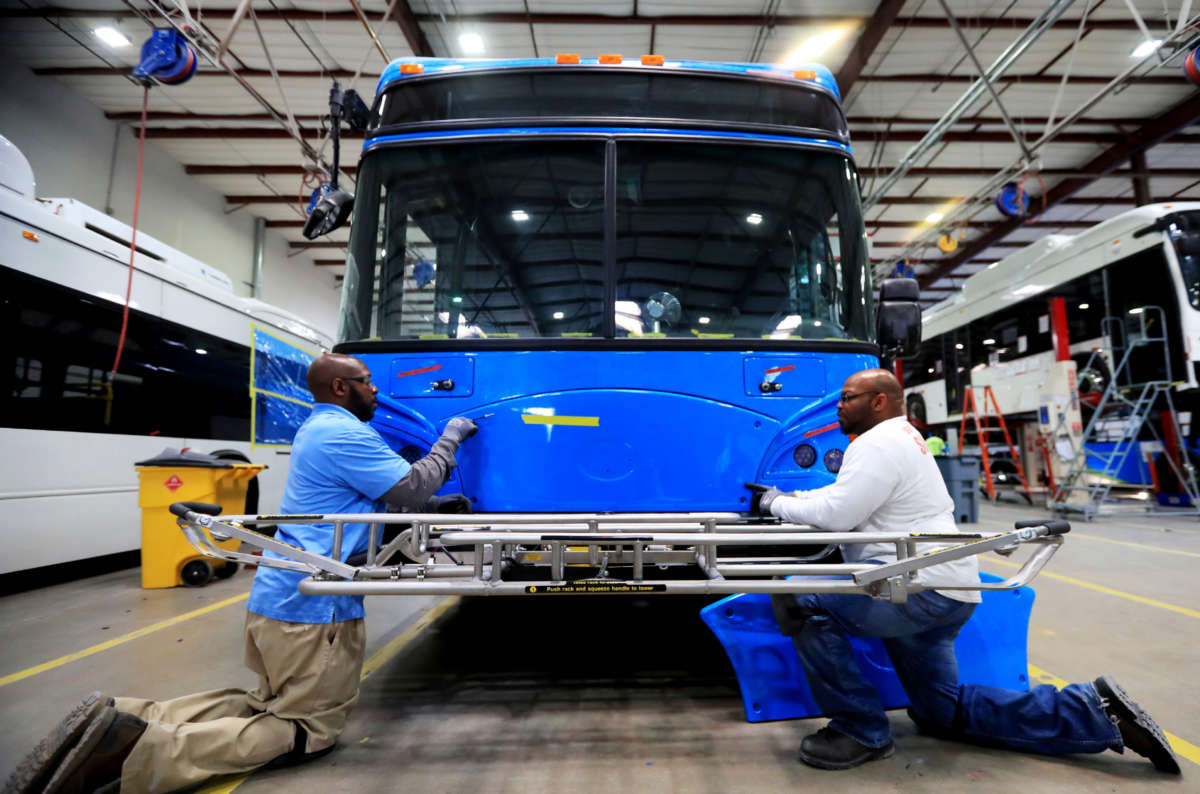A group of progressive congressional legislators has introduced a new proposal to invest $500 billion into infrastructure over the next 10 years in hopes of modernizing and electrifying the U.S.’s public transit systems while meeting ambitious climate targets.
The BUILD GREEN Infrastructure and Jobs Act was unveiled by Senators Elizabeth Warren (D-Massachusetts) and Ed Markey (D-Massachusetts) and Representatives Alexandria Ocasio-Cortez (D-New York) and Andy Levin (D-Michigan) on Thursday. The legislators tout it as an essential facet of climate and Green New Deal legislation, and say it will help the U.S. reach the target of 100 percent clean energy nationwide.
“Electrifying our cars, buses and trains is a central pillar of the Green New Deal,” said Levin in a statement. “The answer to both the climate crisis and the crisis of wealth inequality is to empower working people with the sustainable investments necessary to rebuild the communities devastated by decades of pollution and corporate trade policy.”
Over the next decade, the BUILD GREEN Act would “jumpstart” the electrification of public transportation, expand transportation access in poorer communities and modernize infrastructure by providing up to 85 percent of its cost for localities. The bill also offers an option for the transportation secretary to cover up to 100 percent of those costs.
At least 40 percent of the funding will go to underserved, frontline communities, according to the legislators’ press release on the bill.
The bill ensures that all of the estimated 1 million jobs created by the modernization and electrification effort would be covered by “strong labor provisions for all workers.” This includes either wages compliant with the local prevailing rate (as covered by the Davis-Bacon Act) or a $15 an hour minimum wage, whichever is higher. All contracts would also have mandatory paid leave.
“In most of the country, subways, buses and other public transit are practically inaccessible or completely overburdened,” said Ocasio-Cortez in a statement. “The bill helps ensure that our federal dollars are being invested in infrastructure that can sustain the impact of climate change and better prepares our communities for extreme weather events. We must stop spending billions of taxpayer money on infrastructure systems only for them to fail at the most crucial moment, as we saw recently in Texas.”
A report by Data for Progress released alongside the report found that the bill would not only help tackle the climate crisis but would also provide real tangible benefits for Americans’ health. Electrifying the public bus and railroad fleet nationwide, which Data for Progress finds the bill would more than cover, would result in about 4,200 less deaths annually.
Electrifying buses and railroads would also reduce carbon dioxide emission by 21.5 million metric tons every year, equivalent to taking 4.5 million cars off the road, Data for Progress finds. This change would also avoid around $100 billion worth of health damages a year, according to the report, which is currently undergoing peer review.
The bill has the support of many climate and environment organizations such as the Sunrise Movement, the National Resources Defense Council, the Sierra Club and the League of Conservation Voters. It has five co-sponsors in the Senate, including Sen. Bernie Sanders (I-Vermont) and 15 co-sponsors in the House, including progressive members such as Pramila Jayapal (D-Washington), Jamaal Bowman (D-New York) and Ayanna Pressley (D-Massachusetts).
Though the bill has little chance of passing on its own, the group plans to push President Joe Biden to include it in an upcoming infrastructure bill, Bloomberg reports. As Senator Markey said in a statement, “We cannot build back better without building back greener.”
Thank you for reading Truthout. Before you leave, we must appeal for your support.
Truthout is unlike most news publications; we’re nonprofit, independent, and free of corporate funding. Because of this, we can publish the boldly honest journalism you see from us – stories about and by grassroots activists, reports from the frontlines of social movements, and unapologetic critiques of the systemic forces that shape all of our lives.
Monied interests prevent other publications from confronting the worst injustices in our world. But Truthout remains a haven for transformative journalism in pursuit of justice.
We simply cannot do this without support from our readers. At this time, we’re appealing to add 22 monthly donors before the end of the day. If you can, please make a tax-deductible one-time or monthly gift today.
